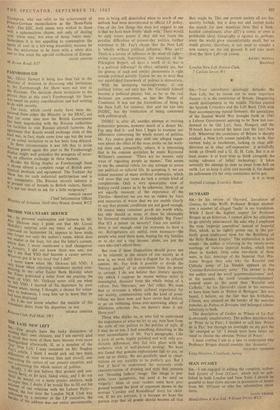OUVRARD
SIR,—In his review of Ouvrard. Speculator of Genius, by Otto Wolff, Professor Brogan enumer- ates a number of alleged 'faults' in my translation. While I have the highest respect for Professor Brogan as an historian, I cannot allow his criticisms to go entirely unanswered. He asks why I employed the term 'imperial assemblies' instead of Imperial Diet, which, as he rightly points out, is 'the per- fectly good traditional term for the Reichstag of the Holy Roman Empire.' The explanation is quite simple: the author is referring to the twenty-seven meetings of various imperial bodies, which took place in Aachen. Only some two-thirds of these were, in fact, meetings of the Imperial Diet. Pro- fessor Brogan then asks why the Royalist and Catholic army of La Vend6e appears as the 'Counter-Revolutionary army.' The answer is that the author used the word 'gegenrevolutionaer' and, in the context, the word 'counter-revolutionary' seemed more to the point than 'Royalist and Catholic.' As for Ouvrard's claim in his memoirs to have been born in Poitou et Bretagne,' this was based, I believe, on the fact that his birthplace, Clisson, was situated on the border of the marches (ranches de Poitou et Bretagne and beloneed admin- istratively to both.
The description of Godoy as 'Prince of La Paz' is obviously unsatisfactory. The author describes him as 'Prinz de la Paix'; I decided to call him 'Prince de la Paz,' but through an oversight on my part the 'de' emerged as 'of.' I would have been better ad- vised to choose the obvious 'Prince of Peace.'
I must confess I am at a loss to understand why Professor Brogan should consider this 'dramatic.'


































 Previous page
Previous page